Trending Now
We have updated our Privacy Policy and Terms of Use for Eurasia Group and its affiliates, including GZERO Media, to clarify the types of data we collect, how we collect it, how we use data and with whom we share data. By using our website you consent to our Terms and Conditions and Privacy Policy, including the transfer of your personal data to the United States from your country of residence, and our use of cookies described in our Cookie Policy.
{{ subpage.title }}
Paris 2024 Olympics - Football - Women's Group A - Canada vs New Zealand - Geoffroy-Guichard Stadium, Saint-Etienne, France - July 25, 2024. Katie Kitching of New Zealand in action with Jade Rose of Canada.
Drama abounds at the Olympics. But not the kind you’d expect.
Canada is making news at the Olympics already – but not the good kind. On Wednesday, two Canadians – analyst Joseph Lombardi and assistant coach Jasmine Mander – were sent home and removed from the women’s soccer team after a member of the support team was caught spying with a drone on the New Zealand women’s team practice. Lombardi was also given a suspended prison sentence from French officials, which he accepted.
Team Canada Head Coach Bev Priestman opted to voluntarily sit out the first game against New Zealand. Fifa is now investigating Priestman, Lombardi, and Mander.
The drone scandal couldn’t entirely distract, however, from the news that singer Celine Dion was seen in Paris, fueling speculation that she could perform at the Olympics. Dion was diagnosed with Stiff Person Syndrome in 2022, which has left her unable to perform.
She won’t be the only artist catching attention in Paris, though. Snoop Dog will carry the Olympic torch on Friday.
The US is expected to win 123 medals and lead the count at the Paris games, while Canada is anticipated to bring home 22, putting them just outside the top 10.
Ukrainian President Volodymyr Zelenskiy and Danish Prime Minister Mette Frederiksen sit in a F-16 fighter jet at Skrydstrup Airbase in Vojens, Denmark, August 20, 2023.
Hard Numbers: Ukraine finally getting F-16s, Hooliganism ahead of Euro semifinal, Snake smuggling in China, Rwanda says no refund to the UK
60: NATO countries have started transferring US-made F-16 fighter jets to Ukraine, the White House announced on Wednesday. Denmark, Norway, the Netherlands, and Belgium have pledged to provide roughly 60 of the fighter jets to Ukraine amid its war with Russia. Kyiv has been pushing for NATO countries to provide F-16s for well over a year. This first batch is being donated by the Dutch and Danish, though it’s unclear precisely how many are being sent at this time.
5: Hooliganism continues to plague the beautiful game … At least five people were injured in Dortmund, Germany, in clashes between Dutch and English football (soccer) fans ahead of the Euro 2024 semifinal between the two countries on Wednesday. Some of the violence was reportedly linked to Dutch fans attacking English fans in bars and attempting to steal flags.
100: In the immortal words of Indiana Jones, “Snakes … why’d it have to be snakes?” A man attempted to smuggle over 100 live snakes into China by hiding them in his pants but was caught by customs officials. He was apparently traveling with a wide variety of reptiles and packed them into drawstring canvas bags sealed with tape that were discovered in his pockets.
280 million: Rwanda says it’s not refunding the UK for a now-defunct deal for asylum-seekers to be deported to the landlocked African country. The UK provided Rwanda with roughly $280 million as part of the controversial scheme pushed by the prior Conservative government, though no deportations ever occurred, and British Prime Minister Keir Starmer says the plan is now dead. The UK on Monday expressed hope it would get some of the funds back, but Rwanda on Wednesday said that wasn’t part of the agreement. “If you come and ask for cooperation and then withdraw, that’s your decision,” said Alain Mukuralinda, a Rwandan government spokesperson, adding, “Good luck.”
OPINION: Here’s why I can’t watch soccer like a normal person
Politics and history have a way of intruding on – even ruining – everything for me, and these days, it’s soccer’s turn.
Right now, most of the Western Hemisphere is engrossed in two major soccer tournaments. In Europe, it’s the Euros, where the Old Countries are battling it out. In the Americas, it’s the Copa América, where the New Ones are.
All told, the countries participating in the two tournaments are home to more than a billion people. So, it’s a big deal – basically two half-filled World Cups at once.
The on-field dramas are rich enough. Will this be the last time an aging Lionel Messi, perhaps the greatest player ever, puts on his country’s uniform? Is this unexpectedly strong Venezuela team for real? Across the ocean, how stacked is host country Germany still? Can England manage to not disappoint?
That’s all good, but when I watch the matches, look at the flags, and read the names on the jerseys, I can’t help but see or think about different things entirely – political things.
So when, for example, French striker Kylian Mbappé, whose parents are from Cameroon and Algeria, puts one in the back of the net, I don’t just wonder whether he really is the best player in the world now (is he?). I also immediately think of the backlash against immigration in France, which – as elsewhere in the EU – has boosted the far right. On Sunday in France, in fact, the overtly anti-immigrant party of Marine Le Pen topped the polls in the first round of the country's snap elections. This despite Mbappé's own direct appeals to young French votersnot to let Le Pen's party win.
On that score, when Austria plays Turkey in a few days, help me NOT flip back to the 1683 Siege of Vienna , when the Habsburgs stopped the Ottomans’ last, best attempt to push into the heart of Europe. Far-right politicians in Europe today, of course, have embraced the symbolism of that exact battle as part of their calls to limit immigration from the Islamic world. Keep an eye on ultra-nationalist Euro Twitter on Tuesday when the match is on.
Back on this side of the Atlantic, the Mexico vs. Ecuador game on Sunday was the most exciting faceoff between the two countries since April, when Ecuadorian police raided the Mexican Embassy in Quito, in order to arrest a former Ecuadorian vice president who had taken asylum there while fleeing a corruption conviction.
But I couldn't help thinking of the bigger Ecuador story: the country is in a state of emergency as murders skyrocket amid a war between Mexican (and Colombian) cartels trying to claim turf in the small Andean country. That violence has driven Ecuadoran asylum seekers as far away as New York City, where a growing migrant crisis is defining the city's politics. (See our special on that here.)
Speaking of migrant crises: Venezuela, -- where political repression, economic mismanagement, and the effects of US sanctions have caused more than 7 million people to flee over the past several years -- is somehow fielding one of the strongest teams at the Copa. Could success at the tournament give a boost to strongman Nicolas Maduro? He could use the help. He is so unpopular that he might actually lose a July 28th election that he has spent years carefully designing in his favor.
You get the point.
I understand this is a little nuts. A sports match is just a sports match. But for any politically minded person, it’s never just a sports matchup when it’s national teams.
Like it or not, the politics of how nation-states define themselves — that is, who gets to be in them, who gets what from them, where their borders really are — is at the heart of so many of the most electric political questions in the world today.
The immigration debates in Europe or the US are about who gets to come in. The socioeconomic, political, and racial fault lines and conflicts within countries of Latin America are, in many cases, what is driving people out.
In just about every country represented at the Copa and the Euros, these questions are shaping -- or reshaping -- politics. I can't help if if I'm seeing that in every match. All I'm doing is watching some soccer, right?
Soccer Football - Euro 2024 - Group C - Serbia v England - Arena AufSchalke, Gelsenkirchen, Germany - June 16, 2024 Serbia fans inside the stadium before the match
The beautiful game can sometimes be ugly
The European Championship, aka the Euros, has been underway for just one week, but it’s already turning political. Serbia wants UEFA, soccer’s European governing body, to whip out a red card for Croatia and Albania over allegations their fans shouted anti-Serbian slurs during a match on Wednesday.
“Kill, kill, kill the Serb,” the fans allegedly chanted. It’s fair to say that Serbia felt this was extremely offside — and the country is threatening to quit the competition if action isn’t taken.
All of this reflects the long-running tensions in the Balkans linked to the 1990s Yugoslav Wars.
“What happened is scandalous,” said Jovan Surbatovic, general secretary of the Football Association of Serbia. “If UEFA doesn’t punish them, we will think about how to proceed.”
Relatedly, UEFA on Wednesday canceled the credentials of a Kosovar journalist for allegedly making a nationalist gesture toward Serbian fans during Sunday’s Serbia vs. England match. Serbian and Albanian fans also scored own goals of sorts by displaying nationalist banners at games, leading to fines from UEFA.
Copa America 2024 - Argentina training
Who’s watching the Copa?
Fans across the Americas will tune in tonight to watch a different type of football – fútbol – as Argentina and Canada kick off the first match of Copa America. The tournament, which features top national soccer teams from North and South America, has been around for over 100 years. This year marks its first edition on its new four-year cycle to align with the UEFA European Football Championship, aka Euros.
Why is the US playing host? The decision was announced last year as a part of a strategic agreement between the CONMEBOL, the South American Football Confederation, and the Concacaf, the North/Central American and Caribbean soccer federation, to develop the sport ahead of the 2024 World Cup, also to be hosted in North America. The other reason is simple: money.
Copa vs. Euro. Despite being the world’s oldest soccer tournament, Copa America has long struggled to escape the shadow of its younger brother, the Euros, for a few reasons. It features fewer teams (16) than its European cousin (24), and the same few teams – Argentina, Brazil, Uruguay – often dominate, making it less competitive overall. Also, while the region is home to some of the world’s best players – Messi, Pele, Maradona, Di Stéfano – it’s a more concentrated talent pool than Europe.
The Euro also outpaces the Copa in scale, money, and publicity – in a day, for example, French superstar Kylian Mbappé made headlines for political activism, a broken nose, and his team’s first Euro match win. It’s hard to compete with that kind of attention.
Feeling competitive? Our in-house Argentinian, intern Sophia Burke, expects the World Cup champs to bring another trophy back to Buenos Aires, but we’ll be watching to see whether the Copa can get enough folks on this side of the Atlantic buzzing about football/soccer to rival the Euros.Kylian Mbappé of France during the UEFA Euro 2024 Football Championship match between Austria and France on June 17, 2024
Footballer Kylian Mbappé attacks France’s far right
“We’re at a crucial moment in our country’s history,” Mbappé warned, alluding to what he sees as threats posed by Marine Le Pen’s far-right National Rally, which performed spectacularly in the recent European parliamentary elections, spurring President Emmanuel Macron to dissolve parliament and call for snap elections. Mbappé encouraged fans to vote on June 30 to block the “extremes knocking at the doors of power.”
Many players on the French team are immigrants or children of immigrants – Mbappé’s parents are from Cameroon and Algeria – putting them at odds with Le Pen’s plans to limit migration strictly. Mbappé’s announcement came hours after his teammate, Marcus Thuram, also urged fans to vote against the far right.
His call to action came after tens of thousands took to the streets of France on Saturday to denounce the far right in protests organized by labor unions and supported by the newly formed left-wing coalition. Polls show the National Rally in the lead, but we’ll be watching to see whether the backlash gains momentum against the far-right’s success ahead of the vote at the end of the month.
Mohammed Kudus, Majeed Ashimeru, and Salis Abdul Samed of Ghana celebrate during the AFCON 2023 match between Egypt and Ghana at on January 18, 2024 in Abidjan, Cote d Ivoire.
9 fun facts about the Africa Cup of Nations
The Africa Cup of Nations is underway in Ivory Coast, with the gut-churning knockout stage set to begin on Saturday. The month-long continental soccer tournament happens every two years and recently expanded to accommodate 24 national teams – all of which began the competition hoping to prove they’re the best squad on a continent of 1.4 billion people. We have compiled a list of what you should know about this tournament, including the political backdrop of the event.
1. From the pitch to peace
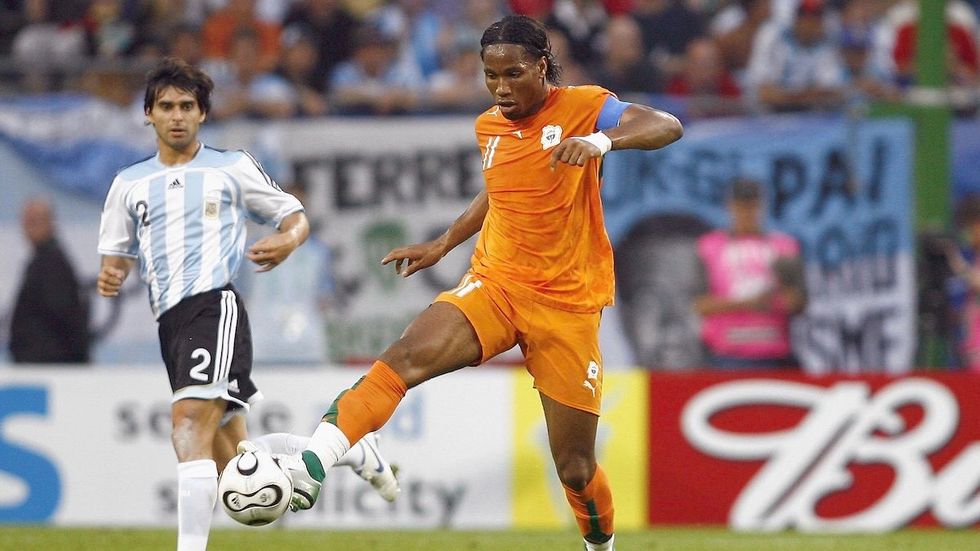
Argentina's Roberto Ayala and Ivory Coast's Didier Drogba during the World Cup in Hamburg, Germany, on June 10, 2006.
Christian Liewig/Reuters
Soccer has played an important role in Ivory Coast’s recent history. In 2005, the country’s national team – particularly international superstar Didier Drogba – helped stop a bloody civil war that began in the West African country three years earlier. Right after Les Éléphants defeated Sudan and qualified for the World Cup for the first time, Drogba issued an emotional call for the warring parties to lay down their weapons for the sake of the country. Drogba’s speech was blasted across the airwaves and ultimately helped lead to a cease-fire.
2. China’s stadium diplomacy
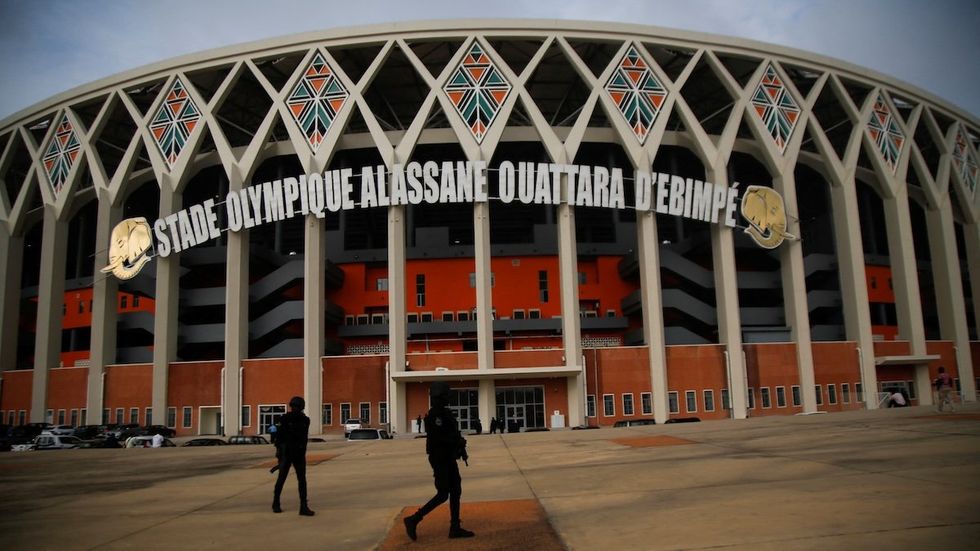
Security forces officers stand guard in front of the Alassane Ouattara Olympic Stadium of Ebimpe in Abidjan, Ivory Coast, on July 11, 2023
REUTERS/Luc Gnago
Three out of six stadiums used for the tournament across Ivory Coast were either built or designed by China, highlighting Beijing’s efforts to expand its influence in Africa through infrastructure projects tied to its Belt and Road Initiative. The Stade Alassane Ouattara Ebimpe, where the final of the tournament will be played on Feb. 11, was built by the Chinese state-owned Beijing Construction Engineering Group.
3. Eyes on the prize money
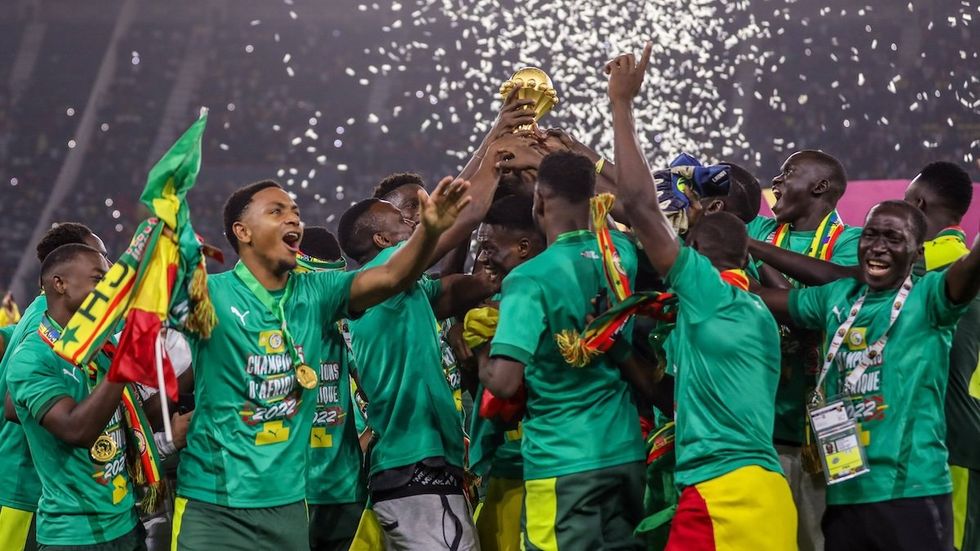
Senegal's national team celebrates after winning AFCON in Feb. 2022.
REUTERS
The winners of AFCON will receive a $7 million prize, which is a 40% increase from what Senegal received when it won the cup two years ago. But it’s still far below what was raked in by the victors of other recent major tournaments. Argentina, for example, received a $42 million prize for winning the World Cup in Qatar in 2022. And all of the teams playing in this year’s UEFA European Championship get over $9 million each – just for taking part.
4. Near-empty stadiums, full-on scandal
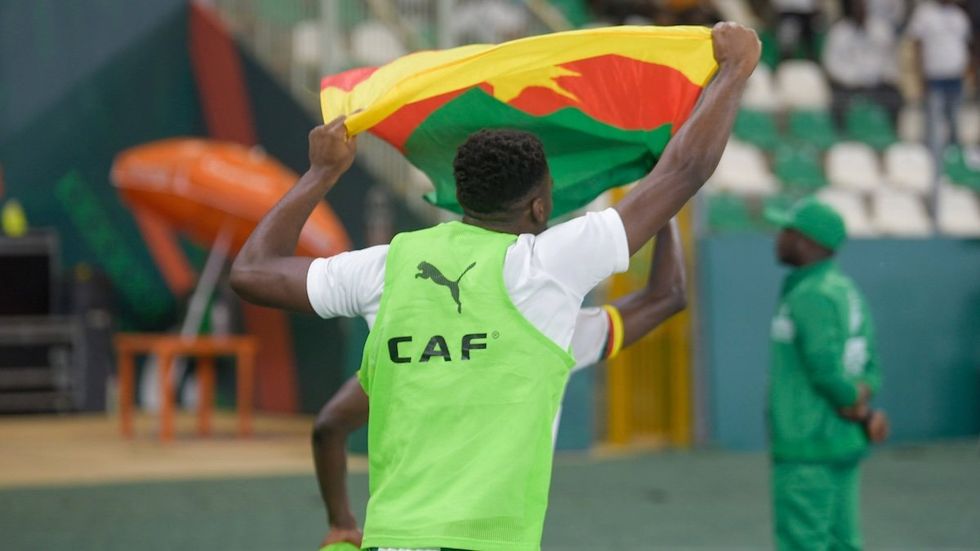
Cameroon during the TotalEnergies Caf Africa Cup of Nations Afcon 2023 match between Gambia and Cameroon at Stade De La Paix on January 23, 2024 in Bouake, Cote d Ivoire.
Didier Lefa/REUTERS
Before the tournament, the African soccer governing body CAF announced staggering numbers of ticket sales to whet the appetites of fans and to show sponsors how viable their flagship product was. But when the tournament kicked off and games were played in almost empty stadiums, people started questioning those numbers. Fans found tickets hard to purchase, and allegations of black market activities swirled across social media — a claim the scandal-plagued CAF has since denied. It attributed the setback to a “printing issue” due to a spike in orders at the last minute.
5. Broadcast battle
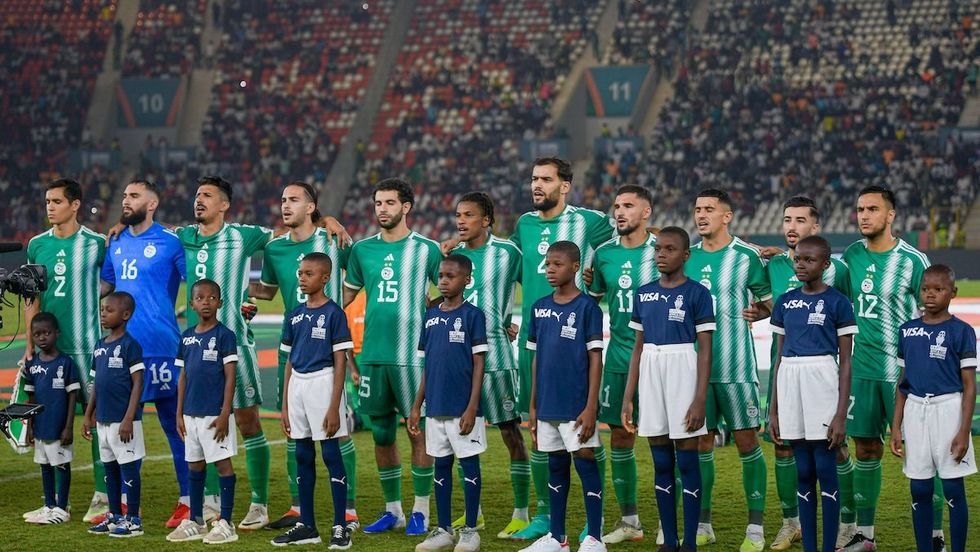
Algeria during the Africa Cup of Nations match between Mauritania and Algeria at Stade De La Paix on January 23, 2024 in Bouake, Cote d Ivoire.
Didier Lefa/Reuters
Just before the tournament began, fans faced the possibility they might miss the highly anticipated event altogether. Africa's largest pay-TV company, MultiChoice, withdrew from an agreement to broadcast the competition to over 20 million subscribers. New World TV, a relatively unknown broadcaster headquartered in Togo, initially outbid the South African company for the rights. They subsequently managed licensing for other broadcasters but couldn’t reach a deal with their South African counterpart. Ultimately, all parties involved hurried to secure a MultiChoice deal just three days before the opening game.
6. Give or take a year
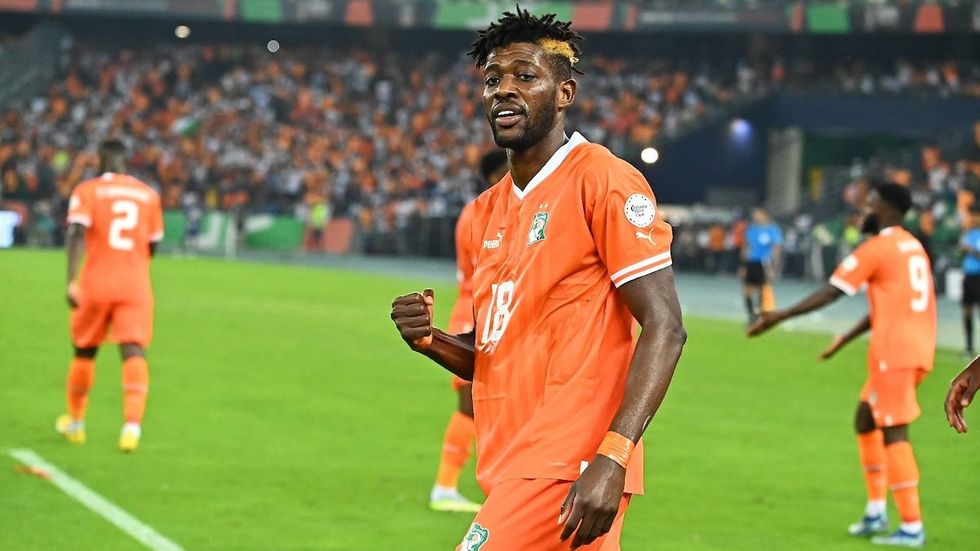
January 13, 2024. AFCON 2023, Ibrahim Sangare, Ivory Coast vs Guinea Bissau, at the Stade Olympique Alhassane Ouattara, Abidjan, Cote D Ivoire
Ebenezer Amoakoh/Reuters
Why is it called AFCON 2023 when it’s 2024? Since 2019, the competition has been planned for the summer to ease scheduling conflicts with the European soccer calendar, where Africa’s biggest stars ply their trades. Planned for the 2023 summer, the competition was postponed in July 2022 due to concerns about weather in Ivory Coast, which promised a torrent of downpours during the Northern Hemisphere’s summer — which even the newly designed Chinese stadiums couldn’t handle. Rather than change its name to AFCON 2024, the initial iteration was maintained for sponsorship purposes. This was also the case with the previous edition, AFCON 2021, which was held in 2022 in Cameroon.
7. Chaos undoes predictions
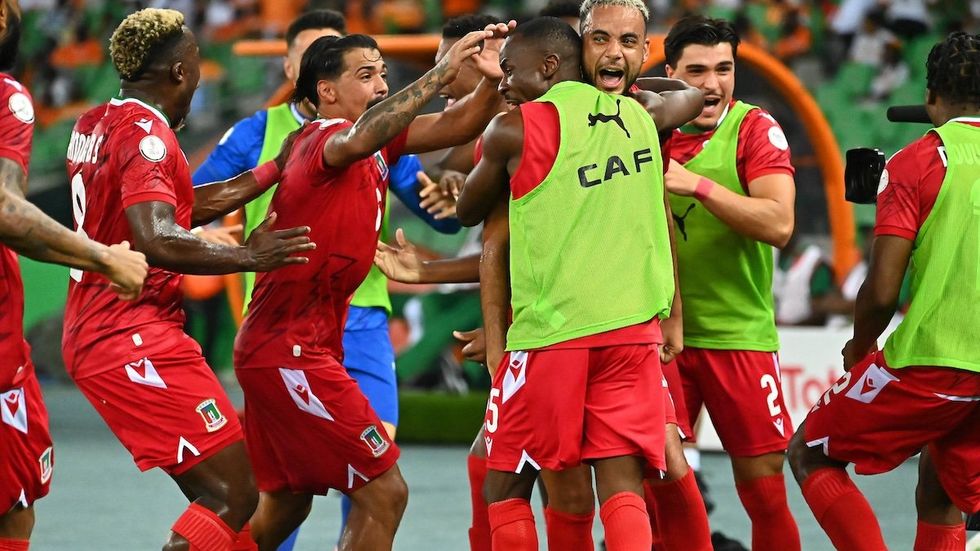
January 22, 2024. AFCON 2023, Pablo Ganet celebrates his goal in the final round of group stage match between Equatorial Guinea vs Ivory Coast, Stade Olympique Alhassane Ouattara, Abidjan, Cote D Ivoire.
Ebenezer Amoakoh
The AFCON defies logic. It is pure chaos. Once the competition commences, most pre-tournament punditry/projections become irrelevant. Ivory Coast, an African football heavyweight and the tournament host, faced the prospect of an early exit after being humiliated by Equatorial Guinea, a country led by a 34-year-old who plays in Spain’s lower league. Ghana is out. Tournament record winner Egypt pulled out all the stops to progress to the knockout stage. 2019 champs Algeria finished bottom of its group after a string of embarrassing results, compounded by a loss to Mauritania — which had never won a game at the competition and is ranked 105th best soccer team in the world. True to tradition, the tournament continues to humble giants.
8. White Elephant project?
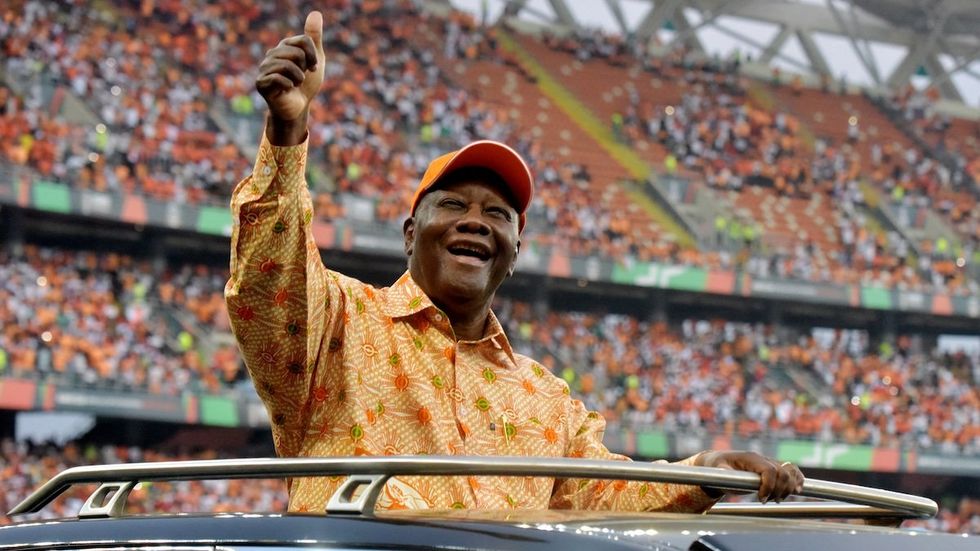
Ivory Coast President Alassane Ouattara during the AFCON opening ceremony.
REUTERS/Stringer
Ivory Coast President Alassane Ouattara seems to have borrowed from the African dictator's playbook: hosting a big, popular sporting event to try to launder his undemocratic image. Ouattara, who is winding down a controversial third-term presidency, knows a thing or two about being autocratic, though it is unclear whether the 82-year-old will try to tighten his grip on power in 2025. But at least through CAF, he’s given Ivorians palpable joy and pride in exchange for popularity. He even grabbed Washington’s attention: Sec. of State Antony Blinken attended one of the games this week as America’s top diplomat was touring the region to hawk America’s soft power.
9. Questionably ‘energizing’ soccer
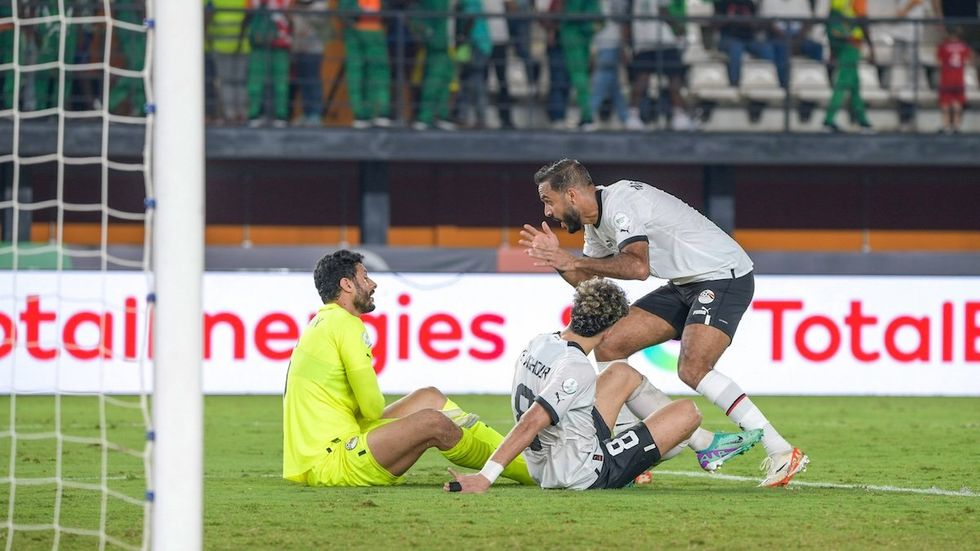
The Africa Cup of Nations match between Cape Verde and Egypt at Stade Felix Houphouet-Boigny on January 22, 2024 in Abidjan, Cote d Ivore.
Didier Lefa/Reuters
Global brands are also notorious for using huge sporting events to whitewash their images, and the AFCON is no different. French oil and gas giant TotalEnergies, controversial for its dealing on the continent, has been the title sponsor of CAF’s flagship competition (and its other tournaments) since 2016.
Interestingly, it still retains this position even as African leaders are increasingly taking a prominent role in the global climate conversation, an issue with severe implications for the continent's 1.4 billion people. What a time to have a global oil giant dominate pitch-side advertising boards and maintain a ubiquitous presence across its endless social media posts to millions of fans.
Captain Christine Sinclair plays her final international game as she retires from Canada's national women's soccer team after a friendly match against Australia in Vancouver, British Columbia, on Dec. 5, 2023.
Hard Numbers: Soccer legend retires, First Nations vote, Trains chug toward zero, Brazil beckons
48,112: Canadian women’s soccer legend Christine Sinclair closed out her career in style this week, leading the national team to victory over Australia before 48,112 adoring fans in Vancouver. Sinclair’s 190 goals scored in international matches are the highest total notched by any woman or man who has ever played the game.
6: It took six rounds of voting, but the Assembly of First Nations has selected a new chief, putting Cindy Woodhouse, the Assembly’s regional director in Manitoba, in charge of the nationwide advocacy group. She takes over after a period of turmoil at the top — the last elected head was ousted in June over allegations that she harassed employees. Key issues for the Assembly include the housing crisis, drinking water access, and a controversial bill that would grant local governance rights to Métis — a distinct community of Canadians of mixed indigenous and European heritage. Many First Nations say the bill would enable Métis to encroach on First Nations’ rights and lands.
0: All aboard! This train is going to zero. The US and Canada have pledged to work together to develop zero-emissions locomotives as part of a broader plan to make the US-Canada rail sector net-zero (i.e., it will reduce at least as much carbon as it produces) by 2050. The focus will be on hydrogen-powered and battery-powered motors.
80.90: With winter blowing in, what better time to consider a sunny getaway to Brazil. Not only is it about to be summertime there now, but the Brazilian government has just launched a new e-Visa program for US and Canadian citizens. It costs $80.90, and the entire application and approval process is handled online. Boa viagem!